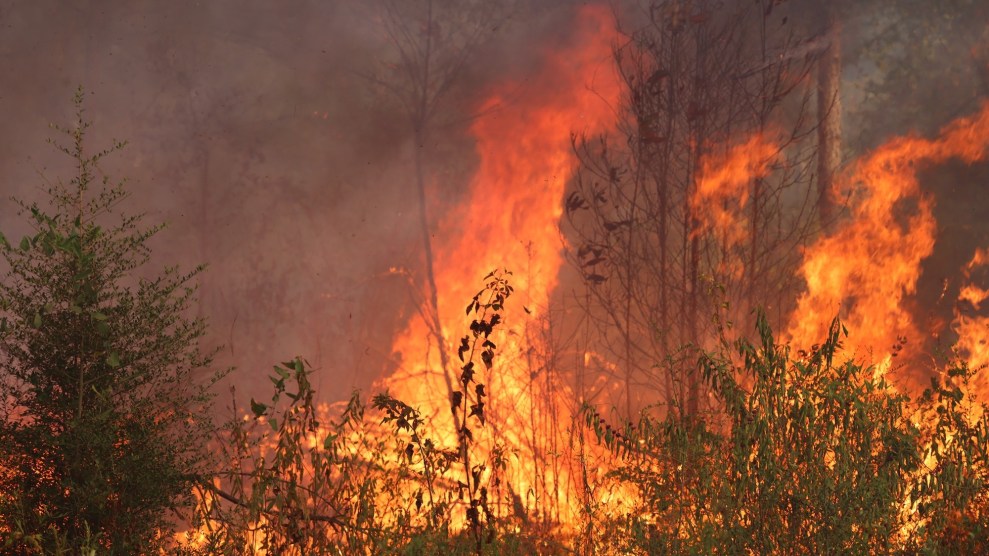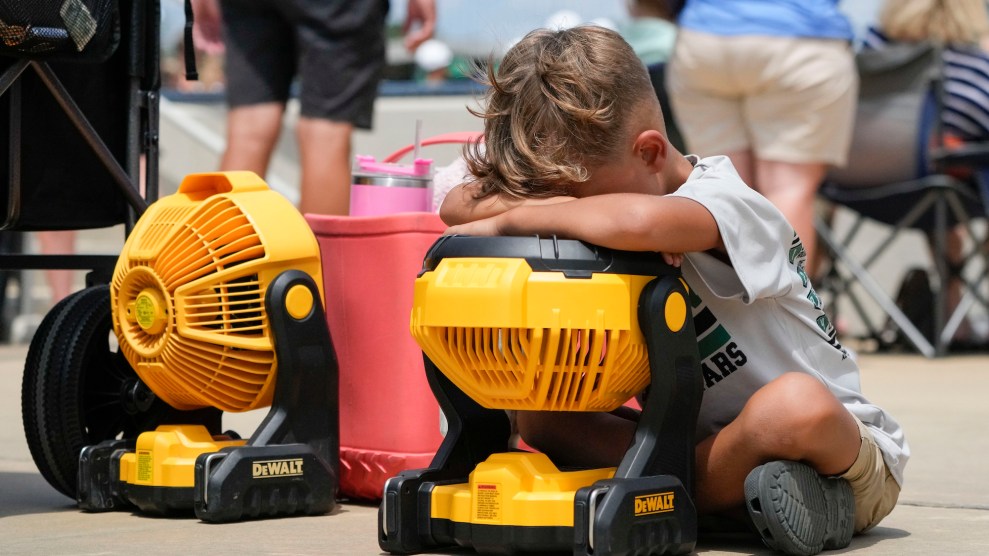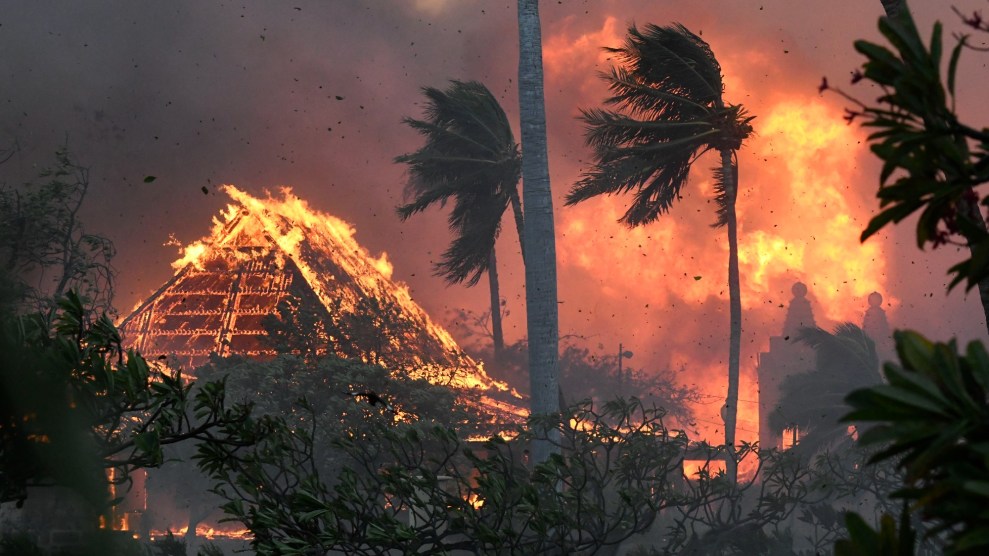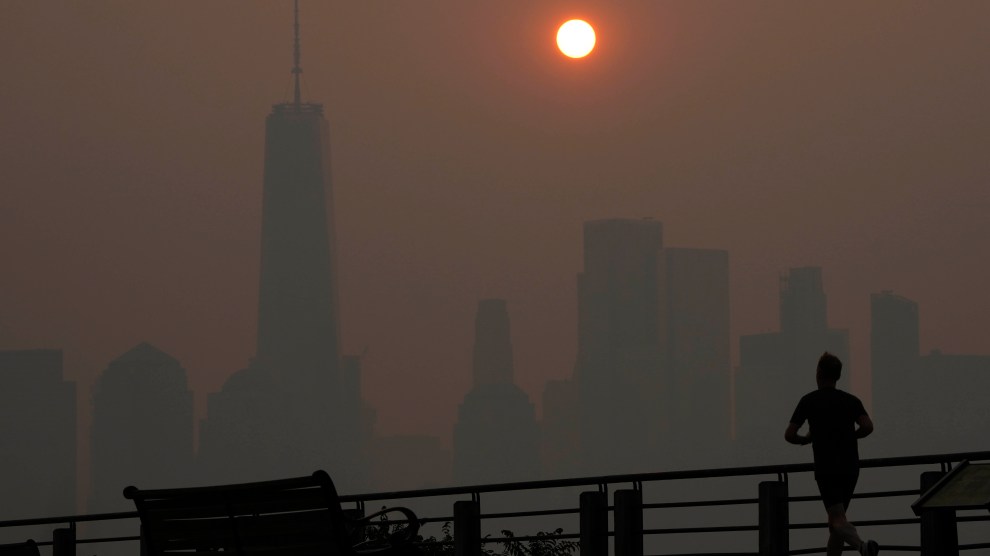
Louisiana Department of Agriculture and Forestry shared this photo of the Tiger Island Fire on Facebook with the message "Please do your part and follow the statewide burn ban."Louisiana Department of Agriculture and Forestry
This story was originally published by the Guardian and is reproduced here as part of the Climate Desk collaboration.
As fire ravaged the pine forests just meters from her community, Necole Allen, her two daughters and other members of the small south-western Louisiana community of Graybow decided to take matters into their own hands.
The Tiger Island fire had spread rapidly throughout Saturday last week, initially a vast plume on the horizon but within hours an inferno at the doorsteps of Graybow Road. It had doubled in size to more than 33,000 acres, the largest wildfire in Louisiana’s history.
With local authorities overwhelmed, Allen began coordinating a volunteer brigade, which amassed seven bulldozers and an improvised fire engine: a large water tank and hose placed on the back of a truck. They set to work.
“Bulldozing, pushing, plowing, hosing,” she said, recalling how flames had licked at the roadway almost “playing chicken” with houses dotted at the sides and radiating immense heat as night began to set in. They worked for almost 24 hours straight, and, remarkably, just one home in the community was lost.
“In my entire life, I have never seen a fire this large,” said Allen, 45, on Monday afternoon, still exhausted as she surveyed the smoking embers and thick smog. The area was now contained, after help arrived from emergency services and national guard troops.
The unprecedented ferocity of the Tiger Island fire, which as of Tuesday morning was still burning more than 30,000 acres with only 50 percent containment, came amid an extreme drought and record heat in Louisiana, in one of the wettest US states currently in the peak of its annual hurricane season. Over the weekend, smoke from wildfires outside New Orleans brought sporadic haze into the city as temperatures soared to 105 F, marking the hottest weekend on record in the area.
About 400 fires have burned in the state in recent weeks, causing at least two fatalities. It is part of a global wave of extreme weather that scientists warn will become the norm without drastic action to address the climate crisis.
“This is the hottest and driest summer in state history,” said John Bel Edwards, the Louisiana governor, on Tuesday, after overnight storms gave first responders hope of containing the fires. He added: “We need a lot more rain before it’s safe out there.”
Disaster relief workers, stationed a few miles from the Tiger Island fire’s perimeter Monday, expressed exhaustion as they prepared hundreds of meals for first responders on the frontlines.
In the town of DeRidder, Tom Bruce, an organizer with the Southern Baptist convention’s disaster relief program, stood in the shade as the temperatures creeped over 100 F.
He has responded to numerous disasters here in recent years, including when the area was struck by two back-to-back hurricanes in the summer of 2020. Some residents still have blue tarps covering their roofs three years later. “Every hurricane season, I think, ‘Gosh, I hope there’s not another one,’” Bruce said. “But nobody saw a fire coming. I’ll take a tropical storm any day over a wildfire. It’s what we’re used to.”
Others expressed concerns about the long-term economic impact of the fire. Beauregard parish, in which DeRidder, Singer and other towns affected by the fire sit, is heavily dependent on the logging industry.
Kelly Bailey, a district president of the parish police jury, a local governing authority, said in a phone interview that authorities were not yet sure how much timber had burned in the fire, but added: “This is going to kill our economy. I don’t know what else to tell you.”
“I am tired, all of our people are exhausted,” she said. “But let me tell you something. We won’t stop. We have lost homes, but we have not lost any lives.”
Like other residents speaking to the Guardian from this heavily Republican region, Bailey was reluctant to draw a link between the disaster and the climate crisis. “I don’t feel like in my position I’m qualified to answer those questions,” she said.
Back at the fire’s perimeter, as it started to rain, Necole Allen took a brief moment of relief. “The things we saw here the other night were just unbelievable,” she said. “We’ve never dealt with anything like it before.”
She felt “blessed,” not “lucky”.
But then she thought again about her husband, who had left early in the morning. An electrical lineworker, he was already heading to the Gulf coast of Florida to help in another disaster as Hurricane Idalia barreled towards land.















